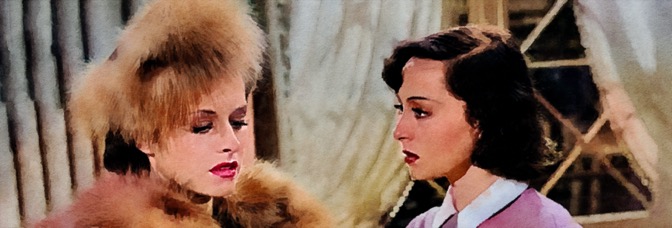Given Dramatic School is all about top-billed Luise Rainer’s rise of stage stardom, it might help if she were actually the protagonist of the story, instead of its—occasional—subject. Because Rainer’s got to share the film with a bunch of other characters, none particularly interesting. There’s Rand Brooks, who’s the headmaster’s son and from a long line of actors. Then there’s Gale Sondergaard as the renowned stage actress turned instructor, who resents having to teach in general and Rainer specifically. Though Rainer idolizes her. Supposedly. We don’t ever really see much of it. And then there’s second-billed Paulette Goddard, who doesn’t have much interested in acting, just gossiping with her classmates and dating a string of wealthy men and refusing to marry any of them.
Virginia Grey, Lana Turner, and Ann Rutherford play some of the other students. Rutherford is dating Brooks and ends up getting more to do than either Grey or Turner (Turner gets fourth billing, which is way too high even without Rutherford).
The film takes place in Paris, which only makes sense when Rainer is onscreen because no one else even hints at a French accent. Rainer goes to acting school all day and works in a factory all night, alongside sympathetic aunt Marie Blake (who has nothing to do in the film whatsoever, not even dote on Rainer when she’s down).
So one fateful night—in the first ten minutes of the eighty minute movie—stage sensation Genevieve Tobin (who’s also way too highly billed at fifth) shows up at the factory with her wealthy beau, Alan Marshal. There’s a little incident, but it’s not important other than to introduce Rainer to Marshal so she can make up this grandiose lie about having an affair with him. Eventually Goddard meets Marshal socially and sets a trap for Rainer, hoping to humiliate her.
Will Marshal let himself be played? Does it end up mattering?
I won’t spoil the first, but it doesn’t end up mattering at all for the narrative. When Rainer gets her big break, it’s got nothing to do with the plot until that point. It’s incredible how fast screenwriters Ernest Vajda and Mary C. McCall Jr. get bored with their… screenplay. Other than Goddard, the script doesn’t dwell on anyone. Turner and Grey are interchangeable, Rutherford is mostly scenery until she all of a sudden gets attention. Goddard doesn’t have a character. She exists as a foil to torment Rainer, who’s usually too busy in her own head to even notice Goddard’s plotting cruelty.
The third act has this big showdown between Rainer and Sondergaard, following the film infusing a “Sondergaard is getting dissed for being an actress nearing forty” subplot, which also brings in Henry Stephenson (as the headmaster) quite a bit. Stephenson’s only slightly less unbelievable as an accomplished Parisian actor than Sondergaard, who no one thought to give more characterization than shrill. She’s in the second scene of the film, bitching about (at that point) utterly harmless and barely introduced Rainer. Sondergaard is opposite Margaret Dumont in that scene; Dumont’s great. Shame she’s only in the movie for two scenes and never when Rainer’s finally out of her shell, which takes way too long. Especially for a movie ostensibly about her.
Rainer’s performance is fine. She gives the best performance in the film, which isn’t much of a compliment. Vajda and McCall can’t even be bothered with thin caricaturization, much less thin characterization. Marshal, for instance, is an utter bore. He’s got some charm, but he’s dramatically inert, upstaged by everyone opposite him. Including an uncredited, nearly silent John Picorri as his valet. Sinclair doesn’t know how to direct his cast, but he really doesn’t know how to direct Marshal.
Of the students, Grey’s probably the best. If Goddard got a character before the third act, she might be better but since she doesn’t… nope. Turner’s kind of annoying.
Sondergaard, who isn’t important for the majority of the runtime, ends up being the most important player in the film. She’s really not up for it. Stephenson’s miscast. Brooks gets a rotten deal as his son too. Supposedly Brooks can’t act. But based on the exercises in the acting classes, none of the students can act. It’s not until the third act, when Rainer’s on a real stage, there’s any evidence of ability. Watching Rainer’s play in the movie, you wish the movie were just Rainer in the play. It might make up for the rest of the nonsense. Unfortunately, it’s not the movie and it’s also way too quick an interlude. Because then there’s the wrap-up, which is simultaneously tepid and vapid.
Dramatic School isn’t terrible. It doesn’t have enough energy to be terrible. Rainer’s got potential, but the script isn’t there and the direction isn’t there. Her character’s name is Louise too. It’s like, if you’re going to have the main character be an aspiring actress with the same name as the successful actress playing her… maybe there ought to be something to that coincidence. At least some emphasis. Instead, the script does everything it can to avoid Rainer and focus on everyone around her. But not give them anything to do until the end. And even at the end it’s just busywork, resolving pointless plot threads.
The film’s competent and useless. Even as a vehicle—as it seems to have been—for MGM ingenues, it’s useless. It seems like it’s more producer Mervyn LeRoy’s fault than anyone else’s. Like, Sinclair obviously wasn’t going to come through on the direction. Ditto the screenwriters. Someone needed to right the ship. No one does.

Leave a Reply